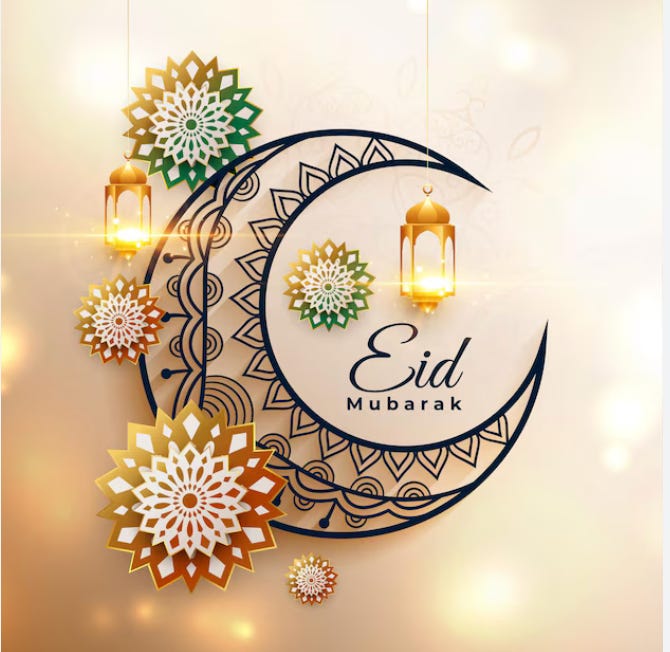All about Eid al-Fitr
Curious about the Islamic celebration of Eid al-Fitr? This is a basic guide to Eid al-Fitr for anyone who wants to know more about this holiday.

What is Eid al-Fitr?

Eid al-Fitr is the celebration that happens that marks the end of the holy month of Ramadan, which is the month of fasting. Eid al-Fitr is also the first day of the tenth month of the Islamic calendar known as Shawwal. Eid al-Fitr is one of two Eids and is the first Eid in the Islamic calendar, with the second being Eid al-Adha, which takes place on the day after hajj during the 12th month of the Islamic year, known as Dhul Hijjah (Eid al-Adha will be covered in more detail in a later post).
Eid al-Fitr means, “the festival of breaking the fast" and is the celebration that marks the end of the holy month of Ramadan. Eid al-Fitr is a day where Muslims celebrate and thank Allah (SWT)/ God for the ability to worship him during the month of Ramadan.
During Eid al-Fitr, Muslims spend time with friends and family, pray the Eid prayer, and reflect and appreciate the blessings that Allah (SWT) has placed in their lives. Additionally, during Eid al-Fitr, Muslims reflect on those who may not have the means to celebrate the festivities and thus they pay something called Zakat al-Fitr, which is an obligatory charity paid by the head of household for all those who are in his home and goes toward those who are in need.
Eid is a time for celebration and worship but also for community because on this day Muslims pray the Eid prayer at their local mosque before going separate ways to celebrate the day.
When is Eid al-Fitr?

Eid al-Fitr happens after the 29 or 30 days of fasting during the month of Ramadan. Like the month of Ramadan, the day of Eid is determined by the sighting of the moon. In the Islamic calendar, the new day begins at Maghrib / sunset, so Eid al-Fitr starts right after the last fast of the month of Ramadan. The Islamic calendar is a few days shorter than the Gregorian calendar, so every year the day of Eid goes back by approximately 10 or 11 days. For example, last year Eid al-Fitr was on April 10th, 2024, while this year (2025) it is scheduled for either Sunday, March 30th, or Monday, March 31st.
Activities During Eid al-Fitr

Wear the best/newest clothes and smell good: On the day of Eid, Muslims usually wear their best or newest clothes because it is a day of celebration. Muslims are also encouraged to purify themselves by having a shower before going to the mosque for the Eid prayer.
Congratulate each other: Muslims usually greet each other with greetings of celebration. A common phrase is “Eid Mubarak,” which means “have a blessed Eid.”
Eid Prayer: The Eid prayer is a special prayer done on the days of Eid. The Eid prayer is special because it's encouraged to be done at the mosque to foster a sense of community and gratitude. It is a way to, “thank Allah (SWT) “for allowing them to spend Ramadan in worship. One hadith/narration of the Prophet Muhammad ( PBUH/ ﷺ ) encourages Muslims to go to the mosque one way and take a different road on the way back home.
Pay Zakat al-Fitr before the Eid Prayer: Zakat al-Fitr is an obligatory charity that the head of household pays on behalf of himself and every dependent living in that household, including children. The money is given to the poor and needy and helps them to, “celebrate the Eid festival with other Muslims.” Zakat al-Fitr is also given as a way to, “ purify the fasting person from indecent words or actions, and to provide food for the needy,” so in other words, it's a way to expiate some sins or mistakes Muslims might have committed during the month of Ramadan as well as a way to provide for the poor and the needy. Zakat al-Fitr is usually given during the month of Ramadan, or on Eid day, up until the Eid prayer; after the Eid prayer, the charity is no longer considered a Zakat and is instead considered an ordinary charity.
Celebrate with Friends and Family: After the Eid prayer, Muslims celebrate Eid al-Fitr with their friends and family. This practice usually includes having traditional foods and some sort of family celebration. Additionally, elders sometimes give money to children with a gift known as Eidi as a reward for being good during the month of Ramadan and as a present for the day of Eid.

Eid al-Fitr is a time of celebration, joy, gratitude, and worship of Allah (SWT). It is a festival where Muslims celebrate being able to worship Allah (SWT) during the month of Ramadan and beyond. It is a time filled with community and family spirit, both within the immediate community and around the world.
If you’re curious about the month of Ramadan, you can check out my Ramadan series below:







Interesting to find out since I'm here in Morocco at the moment and experiencing their Ramadan. I guess I'll experience their Eid al-Fitr too 🙂